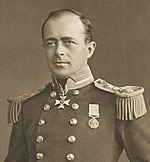Robert Falcon Scott, Date of Birth, Place of Birth, Date of Death
TweetRobert Falcon Scott
Royal Navy officer and explorer
 Date of Birth: 06-Jun-1868
Date of Birth: 06-Jun-1868
 Place of Birth: HMNB Devonport, England, United Kingdom
Place of Birth: HMNB Devonport, England, United Kingdom
Date of Death: 29-Mar-1912
Profession: naval officer, explorer, non-fiction writer
Zodiac Sign: Gemini 
About Robert Falcon Scott
- Robert Falcon Scott (6 June 1868 – 29 March 1912) was a Royal Navy officer and explorer who led two expeditions to the Antarctic regions: the Discovery expedition of 1901–1904 and the ill-fated Terra Nova expedition of 1910–1913.
- On the first expedition, he set a new southern record by marching to latitude 82°S and discovered the Antarctic Plateau, on which the South Pole is located.
- On the second venture, Scott led a party of five which reached the South Pole on 17 January 1912, less than five weeks after Amundsen's South Pole expedition. A planned meeting with supporting dog teams from the base camp failed, despite Scott's written instructions, and at a distance of 150 miles (240 km) from their base camp and 12 miles (19 km) from the next depot, Scott and his companions died.
- When Scott and his party's bodies were discovered, they had in their possession the first Antarctic fossils ever discovered.
- The fossils were determined to be from the Glossopteris tree and proved that Antarctica was once forested and joined to other continents.Before his appointment to lead the Discovery expedition, Scott had followed the career of a naval officer in the Royal Navy.
- In 1899, he had a chance encounter with Sir Clements Markham, the president of the Royal Geographical Society, and thus learned of a planned Antarctic expedition, which he soon volunteered to lead.
- Having taken this step, his name became inseparably associated with the Antarctic, the field of work to which he remained committed during the final 12 years of his life. Following the news of his death, Scott became a celebrated hero, a status reflected by memorials erected across the UK.
- However, in the last decades of the 20th century, questions were raised about his competence and character.
- Commentators in the 21st century have regarded Scott more positively after assessing the temperature drop below -40 °C (-40 °F) in March 1912, and after re-discovering Scott's written orders of October 1911, in which he had instructed the dog teams to meet and assist him on the return trip.
Read more at Wikipedia
See Also
- Famous People's Birthdays on 06 June, United Kingdom
- Famous People's Birthdays in June, United Kingdom
- Famous naval officer's Birthdays on 06 June, United Kingdom
- Famous naval officer's Birthdays in June, United Kingdom
- Famous explorer's Birthdays on 06 June, United Kingdom
- Famous explorer's Birthdays in June, United Kingdom
- Famous non-fiction writer's Birthdays on 06 June, United Kingdom
- Famous non-fiction writer's Birthdays in June, United Kingdom

